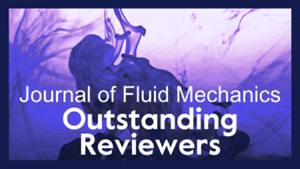We are delighted to announce the launch of the JFM ‘Outstanding Reviewers’ initiative. High-quality reviews are a defining feature of JFM, and this initiative is designed to recognise the significant commitment to reviewing by our expert reviewers across the international fluid mechanics community. Their dedicated efforts in providing constructive reviews greatly enhances the quality of all our JFM publications and contributes meaningfully to the advancement of science.
JFM publishes a wide range of content, covering theoretical, computational and experimental investigations in all aspects of the mechanics of fluids. Our publications include ‘Standard’ articles, ‘Perspectives’ written by invited leading researchers which critically survey the state of a particular fluid mechanics topic, ‘Rapids’ – short, yet still self-contained and complete, papers presenting exciting and impactful results – and ‘Focus on Fluids’, which showcase particularly interesting recent articles published in JFM. Complementing these are the JFM Notebooks, which allow researchers to present not only static, two-dimensional snapshots of their research in article figures, but also publish their underlying data and code. This enables JFM readers to interrogate and probe the data further, sparking new ideas and insights.
At the heart of maintaining our high standards across the key underpinning original ‘Standard’ and ‘Rapids’ contributions are our reviewers, whose rigorous and in-depth reports contribute to ensuring scientific excellence and clarity of presentation. Their ongoing engagement throughout the review process is critical to the success of all our publications.
To recognise these contributions by our reviewers, JFM will annually recognise ‘Outstanding Reviewers.’ These individuals will be selected based on the timeliness and quality of their reviews, input from the Editorial Board, and a final committee selection. This year the committee was chaired by one of us (Sarah Waters) and also included three other associate editors: Ivan Marusic; Jacques Magnaudet; and Roberto Verzicco. The names of these ‘Outstanding Reviewers’ have been published on the JFM website (www.cambridge.org/jfm/prize/reviewers), and to thank the reviewers for their contributions each reviewer will receive a CUP Book Voucher.
In this inaugural year of the initiative, we are delighted to celebrate our first 50 ‘Outstanding Reviewers’ listed below. The list highlights and showcases the diversity of our fluid mechanics community. In future years, JFM will annually recognise the top 1 % of reviewers. Congratulations to everyone recognised this year, and our sincere thank you to all our reviewers for their invaluable contributions.
Micheline Abbas
Institut National Polytechnique de Toulouse, France
Meheboob Alam
Jawaharlal Nehru Center for Advanced Scientific Research, India
Lorna Ayton
University of Cambridge, UK
Suresh Behara
General Electric Aerospace, Bangalore, India
Luca Biferale
University of Rome ‘Tor Vergata’, Italy
Angela Busse
University of Glasgow, UK
André V. G. Cavalieri
Instituto Tecnológico de Aeronáutica, Brazil
Stefania Cherubini
Politecnico di Bari, Italy
Daniel Chung
University of Melbourne, Australia
Filippo Coletti
ETH Zurich, Switzerland
Luc Deike
Princeton University, USA
Paul Durbin
Iowa State University, USA
Benjamin Favier
CNRS, France
Bettina Frohnapfel
Karlsruhe Institute of Technology, Germany
Daniel Fuster
Institut D'Alembert, CNRS, France
Basile Gallet
Université Paris-Saclay, CEA Saclay, France
Pascale Garaud
University of California, Santa Cruz, USA
John Gray
The University of Manchester, UK
Wei-Xi Huang
Tsinghua University, China
Joseph Klewicki
University of Melbourne, Australia
Katarzyna Kowal
University of Glasgow, UK
Mogeng (Morgan) Li
University of Sydney, Australia
Paolo Luchini
Università di Salerno, Italy
Xisheng Luo
University of Science and Technology of China, China
Omar Matar
Imperial College London, UK
Sébastien Michelin
Ecole Polytechnique, France
Davide Modesti
Gran Sasso Science Institute, L'Aquila, Italy
Vivek Narsimhan
Purdue University, USA
Andrea Prosperetti
University of Houston, USA
Alain Pumir
Ecole Normale Superieure de Lyon and CNRS, France
Maurizio Quadrio
Politecnico di Milano, Italy
Marco Edoardo Rosti
Okinawa Institute of Science and Technology, Japan
Kirti Chandra Sahu
Indian Institute of Technology Hyderabad, India
Vatsal Sanjay
University of Twente, The Netherlands
Peter Schmid
King Abdullah University of Science and Technology (KAUST), Saudi Arabia
Ory Schnitzer
Imperial College London, UK
Ganesh Subramanian
Jawaharlal Nehru Centre for Advanced Scientific Research, India
Chao Sun
Tsinghua University, China
Outi Supponen
ETH Zurich, Switzerland
John Tsamopoulos
University of Patras, Greece
Takahiro Tsukahara
Tokyo University of Science, Japan
Laurette Tuckerman
PMMH (CNRS, ESPCI-PSL), France
Francisco J. Valdés Parada
Universidad Autónoma Metropolitana-Iztapalapa, Mexico
Jianchun Wang
Southern University of Science and Technology, China
Stephan Weiss
Deutsches Zentrum für Luft- und Raumfahrt, Germany
Lei Wu
Southern University of Science and Technology, China
Heng-Dong Xi
Northwestern Polytechnical University, China
Xiang Yang
Penn State University, USA
Yantao Yang
Peking University, China
Zhaosheng Yu
Zhejiang University, China




